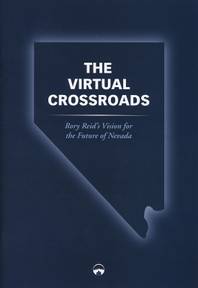Wednesday, Oct. 14, 2009 | 2 a.m.
Related Document (.pdf)

In his blueprint, Democratic candidate for governor Rory Reid writes that the state should capitalize on its natural advantages.

Rory Reid
Sun Archives
- Speaker Barbara Buckley says she won't run for governor (9-11-2009)
- As the Reids seek office, who hurts whom? (9-8-2009)
- Political intrigue brewing in the 2010 governor's race (8-16-2009)
- Rory Reid hits duo of likely rivals with 1 stone (6-18-2009)
- Rory Reid lays ground for run for governor (9-12-2008)
- Building Trades council endorses Rory Reid for governor (6-8-2009)
Sun Coverage
Sun Blogs
Beyond the Sun
Rory Reid released a 30-page blueprint for Nevada timed to his announcement today that he is running for governor, and in the process he told a hard truth, wrapped in a pleasant myth.
The hard truth, which Reid doesn’t shy from: The good old days of a recession-proof, ever-growing Nevada where jobs are easy to come by are not coming back. The Silver State must change or continue its decline.
“We have a state government built for the 19th century and happy to stay there, looking no further ahead than yesterday, squandering what we have today and failing to invest in tomorrow,” he writes. “I see a different road ahead for Nevada.”
The easy myth: Changing will be relatively cost-free and just take some know-how.
The next governor will face a $2 billion budget hole, and the kinds of strategic investments needed to diversify Nevada’s economy will take real money.
The Democratic candidate can hardly be blamed for failing to acknowledge how difficult significant reform will be without new revenue. His competitors won’t admit it either. The Republican field — Gov. Jim Gibbons, former U.S. District Judge Brian Sandoval and former North Las Vegas Mayor Mike Montandon — has focused on a simple message: Government must learn to be more efficient.
Although Reid says details will come later, he calls for a comprehensive performance review of state government to find savings. Reid, the Clark County Commission chairman, says he would require the state to follow the lead of local governments in developing long-term plans for financing services and infrastructure needs.
He also hints at potential targets, including the state’s payroll tax, which he says is tantamount to taxing job creation. He says Nevada should consider a Colorado proposal that would give a tax credit to businesses that create at least 20 new jobs. The credit would cover 50 percent of a company’s annual payroll taxes for five years.
Nevada, Reid argues, should capitalize on its natural advantages. For one, the state is a major intersection for shipping lanes and air connections. It could become an international shipping hub, combining logistics, warehousing and distribution. Like Delaware, Nevada should use its business-friendly incorporation laws “more strategically” to attract those companies, he says.
Reid says the state’s arid and disaster-free weather also presents an opportunity for information technology firms. Nevada could become the nation’s “IT closet,” a data storage center for all sorts of companies, he says.
As for the state’s renewable energy potential, Reid proposes to expand the tax incentives passed by this year’s Legislature. Government, he says, will lead by example on sustainable building and energy efficiency — and require “major new private-sector buildings” to incorporate renewable energy.
The state must go beyond its traditional sales pitch of low taxes and scant regulation to attract new businesses, Reid says. He proposes going after “higher-growth, higher-wage” industries through investments in infrastructure and education — which he notes have paid dividends for other states, including California, New Mexico and Washington.
Toward that end, he proposes creating a fund to invest in research institutions, such as the Nevada Cancer Institute, in the hope of creating industry clusters that would profit from the research.
He also proposes creating a “Nevada Capital Investment Corporation” to foster venture capital projects here. A matching-grant program could assist small or startup businesses, he says.
Reid also says the state should provide incentives for Nevada’s higher-education institutions to focus more on research and development. A “Technology Development Corporation” could help market technology developed on college and university campuses in the private sector, he says.
To make the state more competitive, Reid proposes infrastructure investments, including high-speed rail systems, mass transit and broadband Internet access.
“We ... face a stark choice between continuing down the same path we have always traveled — which got us into this mess — or striking out in a bold new direction that promises greater gains in the long term,” Reid writes.
Michael J. Mishak can be reached at 259-2347 or at [email protected].

Join the Discussion:
Check this out for a full explanation of our conversion to the LiveFyre commenting system and instructions on how to sign up for an account.
Full comments policy